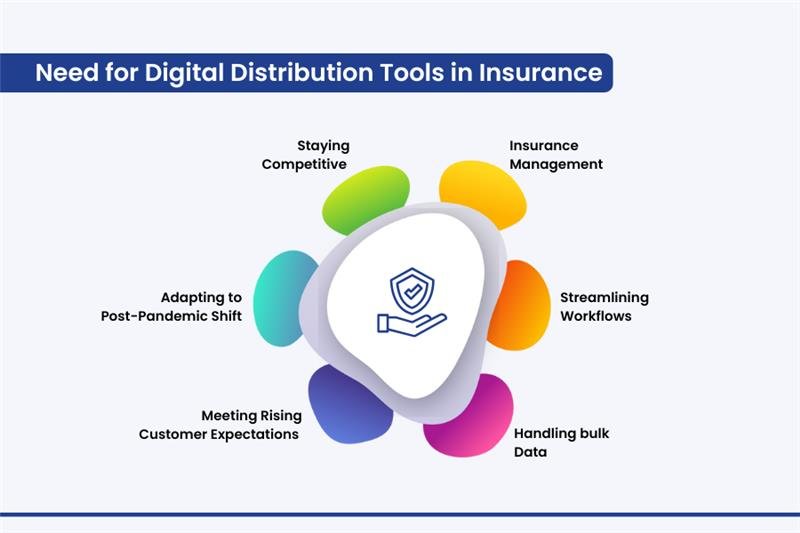
The digital distribution of insurance revolutionizes the way insurance products and services are delivered, managed, and accepted. Digitizing insurance has transformed cumbersome, paper-driven workflows in the insurance industry into efficient and streamlined systems that benefit all stakeholders such as insurers, reinsurers, underwriters, banks, brokers, agents, etc. Overall, digitalization eliminates the outdated manual process enhancing compliance, reducing errors, and improving the overall experience of buying and managing insurance.
What makes this transformation even more groundbreaking is the integration of cutting-edge technologies such as AI (artificial intelligence), cloud computing, and big data analytics. This empowers the insurance industry even more to adapt to modern consumer expectations and market demands.
Let’s explore how digital distribution revolutionize the insurance industry through software solutions in detail in this blog post.
Need for Digital Distribution Tools in Insurance

With the increasing awareness among people, rising health concerns, and surge in insurance adoption especially in the post-COVID-19 era. With the increasing demand for insurance policies and heightened expectations from both customers and agents, the need for digital distribution tools in insurance is a must.
Here are some compelling reasons that suggest why digitalization is essential in the insurance industry:
Staying Competitive
With increasing competition, insurance company solutions are not limited to just offering a good number of insurance products and services, but they are also required to offer personalized, smart, and innovative solutions. Without going ahead such companies might lose their market share.
Insurance Management
The complexity of managing diverse insurance products, services, criteria, and regulatory compliances is a significant challenge nowadays. This raises the need for a centralized and automated solution that can simplify operations for distributors and provide better tracking and analytical tracking for insurers and reinsurers.
Streamlining Workflows
The insurer’s role has become more demanding with increasing challenges alongside growing opportunities. This gives rise to a solution that can ease handling complex operations.
Handling Bulk Data
The insurance industry has to handle vast amounts of data, including policy information, conditions, and customer details. Managing all of this manually or on paper is no longer viable, which has created a demand for insurance software solutions.
Meeting Rising Customer Expectations
Modern customers are smarter and more aware of the increasing need for more smart and equipped tools to showcase products, compare policies, and ensure seamless procedures from application to completion of policy.
Adapting to Post-Pandemic Shift
The post-pandemic situation has increased the demand for tools that can be accessed both online and offline, such as online customer verification, self-service tools, and virtual consultations. Digitalization can help keep pace with the changing times.
Impact of Digital Distribution of Insurance Solutions

The adoption of digital distribution insurance solutions has been a game-changer for insurance companies in significant ways. This not only allows them to achieve their insurance goals with unparalleled efficiency and customer satisfaction.
Here are some of the key impacts digital insurance software is making:
Expanded Reach
Digital insurance solutions combined with advanced technologies such as AI help insurers and distribution partners overcome compliance challenges, regulatory protocols, and even language barriers. This expanded reach caters to a diverse audience breaking language and compliance barriers.
Boosted Sales and Productivity
Digital solutions automate processes from application to policy issuance and beyond eliminating redundant tasks, and paperwork and enhancing overall efficiency. This also enables distribution agents to provide more improved and personalized experiences resulting in higher productivity and a noticeable increase in policy sales.
Improved Customer Satisfaction
Lengthy insurance forms are a thing of the past thanks to digital solutions. They offer customers a quick, seamless, and personalized journey. This also fosters trust and loyalty ensuring customer satisfaction.
Better Outcomes
There are digital distribution solutions available that offer smooth integration with already existing or third-party solutions. This not only streamlines and automates the tasks but allows insurance stakeholders to make intelligent data-driven decisions and deliver better outcomes for both insurance businesses and customers.
Improved Collaboration and Transparency
Digitalization fosters better collaboration between insurers, reinsurers, and digital distribution partners. With transparent processes and shared access to critical data, stakeholders can work cohesively to achieve shared insurance goals efficiently.
Centralized Control and Management
The Cloud-powered insurance management systems offer centralized control ensuring adherence to rules, regulations, and compliance. These systems enhance risk management, provide secure and real-time data access, and allow authorized personnel to manage and monitor operations anytime and anywhere.
Can Insurance Company Survive Without a Digital Distribution Solution?
Insurance companies thrived before digitalization, but things have changed significantly. With the increased demand for insurance, increased competition, and evolving compliance requirements – surviving without digital distribution solutions is becoming difficult.
Modern customers also prefer online experience over paper-based processes that save both time and effort. Additionally, AI-driven digital solutions offer intelligent tools for streamlined processes, personalized workflows, and efficient online verification, making operations smoother for insurers and more satisfying for customers. Without integrating these staying relevant in the insurance industry could be a struggle.
Whether you want to be fully digital or adopt a hybrid approach, incorporating digitalization is essential. Platforms such as Ensurite provide AI-powered solutions catering needs of insurers, reinsurers, and distribution partners in achieving insurance goals. Contact us today to know more about the solution.
Frequently Asked Questions
How Does the Digital Distribution Revolutionise the Insurance Industry?
Digital distribution in the insurance industry primarily eliminates the need for paperwork, which simplifies data management, and verification, and reduces manual errors. Additionally, it streamlines overall workflow, automates redundant processes, addresses compliance barriers, and ensures compliance requirements are met. Furthermore, the integration of proven technologies also aids in scaling operations, speeding up processes, and increasing overall effectiveness.
What are the benefits of digital insurance platforms for insurers?
Digital insurance platforms provide numerous benefits for insurers, including:
- Enhanced Efficiency: Automating repetitive tasks reduces manual errors and makes the insurance process faster and more compliant.
- Streamlined Workflows: Centralized management improves operational processes.
- Increased Sales: Faster application and policy issuance drive productivity.
- Data-Driven Decisions: AI and analytics tools provide to capability to verify the details provided, ensure the requirements are met, and improve underwriting and assess risk.
- Customer Retention: Digitalization significantly enhances the customer experience, better service delivery, and more clarity of policy. As a result, this fosters deeper customer loyalty and satisfaction.
How does AI enhance the digital insurance distribution process?
AI revolutionizes the digital insurance distribution process by:
- Assisting in analyzing the vast data.
- It automates the routine tasks.
- It gives actionable insights and personalized recommendations.
- It also assists in eliminating errors, non-compliance, and other requirements for the policy.
- Verification of client and their data can be done online with AI.
- Communication and collaboration with customers or other insurance stakeholders also improve with AI assistants.
What role does automation play in streamlining insurance operations?
Automation simplifies and accelerates insurance operations by:
- Eliminating manual paperwork and reducing human errors.
- Streamlining tasks such as policy issuance, renewals, and claims processing.
- Integrating workflows across departments for centralized management.
- It establishes regulatory checks to improve compliance adherence.
- Effective and quality lead nurturing by agents as they get more time.
How does digital distribution improve customer experiences in the insurance industry?
Digital distribution elevates customer experiences by:
- Many digital insurance platforms offer 24/7 accessibility through online platforms.
- They offer simplified self-service tools making customers independent of agents.
- Providing personalized solutions tailored to customer needs.
- The customers get more clarity, transparency, and convenience.
- AI chatbots also assist customers with prompt responses to their queries.
What are the challenges of adopting digital insurance distribution platforms?
Digital insurance distribution platforms bring various benefits but adopting the same can present challenges, including:
- Integration with Existing system: Adopting a digital platform can make it difficult to integrate smoothly with third-party systems.
- Technical Expertise: There are platforms that can be difficult for insurers, reinsurers, or distribution partners to work due to the technical knowledge or training they require.
- Resistance: The insurance stakeholders may find accepting new systems or processes difficult.
- Personalization: Altering insurance processes, products and services might be difficult or challenging with some digital distribution platforms.
- Security: The privacy of customer data and information can also be a challenge.
How does digital insurance distribution contribute to reducing operational costs for insurers?
Digital insurance distribution reduces operational costs by:
- Minimizing paperwork and associated expenses.
- Automating processes and reducing repetitive tasks and manual work.
- Increased productivity through centralized data.
- Faster policy issuance saving time.
- Avoid unnecessary losses, errors and non-compliance.
